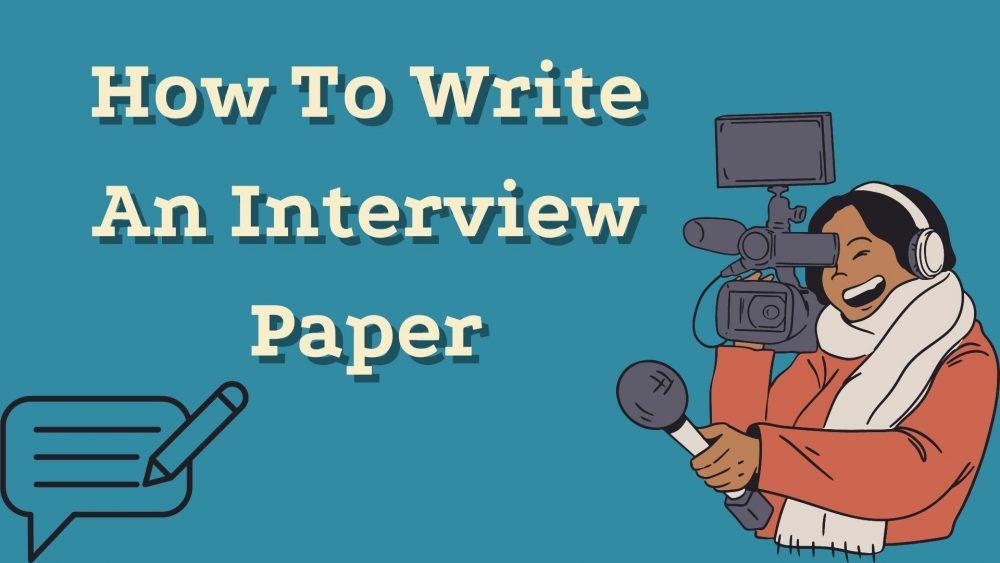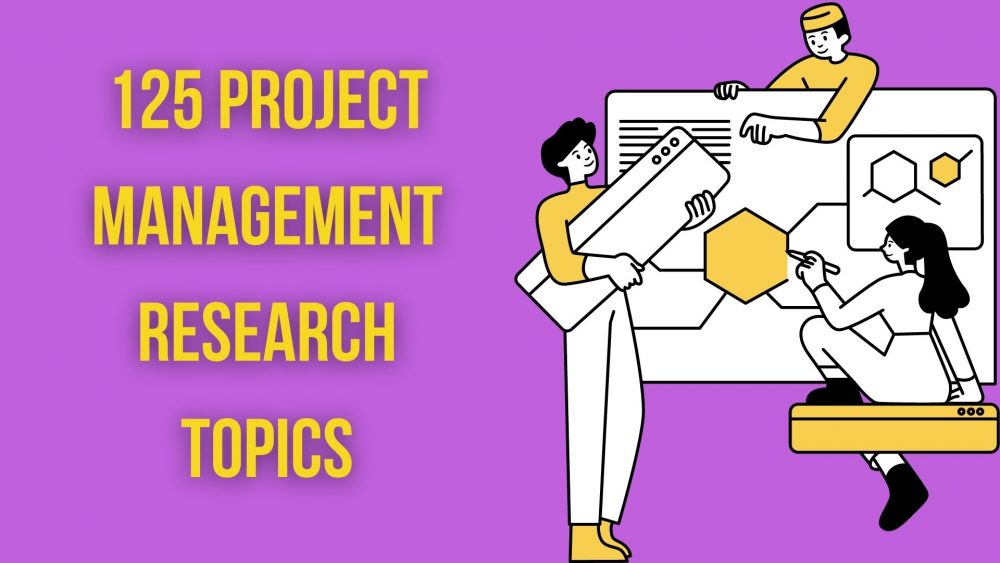While you’re in school and studying different subjects, it can be tricky to understand each assignment’s needs and depths, especially long-form research papers that might count for a large percentage of your total grade. Writing an interview paper can involve a lot of research, require a lot of time and effort to find and schedule interviews with the right people, and write an engaging and easy-to-read piece. So here’s your ultimate blueprint on how to write an interview paper!
Contents
- What Is An Interview Paper?
- How To Write An Interview Paper?
- The Step-by-Step Guide On Writing an Interview Paper
- How to Start an Interview Paper?
- How to Write a Conclusion for an Interview Paper?
- How to Format an Interview Paper?
- Checklist of Essentials for an Impressive Interview Paper
- Topics for an Interview Paper
What Is An Interview Paper?
An interview paper is an intriguing but complex assignment to write about a topic that incorporates interviews and perspectives of different people on the issue. These interviews are usually with people who are stakeholders in a problem or the general public that has been inevitably affected by a country’s policy or about a particular case that caused havoc. In addition, it can also be a descriptive piece elaborating on the personal experience or anecdote of one person.
It’s definitely a learned skill and requires a lot of effort into cultivating precise questions networking to find the best people to interview (they can range from being your family members who were involved in a particular issue or have stark opinions on your topic to policymakers and governors who contributed to either passing or striking a specific act), and finally putting it all together to communicate the varying perspectives effectively without bias.
Here’s an excerpt from an interview paper example:
With the recent upsurge in mental health and psychology, many experts in the field are celebrating the increased awareness but also worry about the dissipation of false information. Especially with social media, information is communicated from one part of the world to another within seconds. It can lead to the misuse of terms and psychological context, leading to severe harm and damage.
Dr. Rosen Luis, a professor of abnormal psychology at the University of Georgia, elaborated upon the issue of false information being spread on social media in a personal interview conducted last year. “As social media penetrates the global world at a more rapid rate than anything else in the world, sensitive information like that regarding mental health can easily be misused or leveraged in incorrect circumstances due to the lack of supervision on growing platforms. Social media also creates unrealistic expectations about how a mental illness should look. There’s no one distinct way a disorder manifests in everybody and can lead to different lifestyle changes for different people.” (R. Luis, Phone Interview, Jun 22, 2021)
How To Write An Interview Paper?
So you might be thinking about how to write a paper based on an interview and what are the different components of such a paper? Well, a lot goes into an article of this kind, so it’s essential to break it down into separate elements so you can tackle each with great effort and accuracy to cultivate a solid assignment and fetch a top grade!
If you have the freedom to choose your topic for the assignment, it is essential that you pick up a contentious concept that is the center of debate and leads to some civil discourse. An interview paper needs to be backed with air-tight research and credible interviews taken ethically and incorporate direct, in-depth questioning and sources.
Now you may be wondering how to include an interview in a research paper, mainly because interviews often look like scripts instead of concrete research material, so it’s important to note that while your discussions will be long-form and extensive, you’ll have to pick and choose responses from your different interviews to use as quotes or credible backing for your statements within the content of the paper.
If you have no desire to get all those knowledge or experience a long tiring writing process, you can use an opportunity to buy cheap dissertation online.
The Step-by-Step Guide On Writing an Interview Paper
To make the writing process easier, you should be absolutely sure in what to do in each step. Here is a list of steps you need to take to get a perfect interview paper.
- Step 1 – Selecting the ideal topic for your paper: The topic you end up choosing for your interview paper can genuinely make or break your grade. It’s best not to look at generalized ideas or concepts that have been established as facts, as it’s unlikely that such topics will have a large-scale difference of opinion. Searching for a good case could begin with looking for issues that cause healthy discussion, differ within groups of different cultural, political, social, or economic backgrounds, and are essential conversations to have. It’s vital to ensure that the topic doesn’t cause a threat to someone’s rights, identity, or existence.
- Step 2 – Ideation and Research: Now that you’ve established your topic and a basic crux of your thesis statement, you can begin ideating the direction you want to take your paper. For instance, you choose capital punishment and its use to decrease long-term crime patterns in Singapore (known to have one of the highest percentages of the executed population via capital punishment), you’ll think about whether you want to talk about its history, grassroots change, crime statistics and also decide who all you’ll want to interview. A big part of writing an interview paper is finding people from diverse backgrounds with conflicting opinions to give your readers a 360-degree view on the issue.
- Step 3 – Crafting your interview questions: After having decided your topic and doing in-depth research about the same, it’s time to curate a set of interview questions that are brief, to-the-point, and extract the information you require for your assignment. Crafting good open-ended questions is a learned skill and will improve with the number of interviews you prep for. Ensure that all your questions are about the topic, fact-checked, and easy to understand for the interviewee.
- Step 4 – Taking the interviews: Once the interview blueprint is ready, you’ve to schedule and conduct interviews with the people you’re choosing to talk to (it is preferred that you conduct interviews in-person, so it is as personal and direct as possible). Be sure to ask your questions clearly and record the interviewee’s responses using a recording device so you can precisely transcribe the answers afterward. It’s crucial that your interviewee feels comfortable talking to you about the topic, especially if it is something very sensitive and personal. Good interview ethics also involve letting your respondent know they can communicate if they want something they spoke about to be scratched out of the interview.If you’re planning on using published interviews, you can skip the third and fourth steps and pick up essential quotes from the already published interviews. Remember to cite the quotes in the correct format so that you don’t get into any unnecessary plagiarism issues.
- Step 5 – Creating an outline: With regards to the obtained interview responses, you’ll create a very detailed skeleton for the interview paper, so you know precisely which idea goes where. This will help you when you finally get down to writing the actual essay, as you’ll be able to keep track of your different ideas, quotes, and sources and establish an engaging flow. You can also spend some time writing transitionary sentences that you’ll use when you move from one paragraph to the next.
- Step 6 – Writing the paper: Now that you’re done with all the back-end research, interviewing, and outlining, you’ve to sit down and fill in the gaps to produce a stellar essay. You have all the elements you need to decrease your distractions, be charged up, and just write it out. Contrary to popular belief, writing is actually a learned skill. Even if you don’t believe you’re as good with words as others, learning a few tips and tricks can easily elevate your writing to a notch above. Using precise and appropriate vocabulary, leveraging analogies, metaphors, and other language elements to convey your ideas, and having perfect grammar and syntax are some of the ways you can better your writing.
The basics of any paper are a thesis statement, introduction, body, and conclusion. You would’ve formulated your thesis statement while ideating the direction you wanted to take your paper in, and through the outline, you’ve hopefully followed the one-idea, one paragraph to give rise to a well-constructed body. Here’s some guidance on the two components that determine the first impression and last impression your reader has of the paper:
How to Start an Interview Paper?
The introduction of your interview paper is the first thing that the reader looks at, so it’s crucial to hook the reader to keep them engaged to follow through with reading the paper. You can include:
- Your thesis statement
- Intriguing data about your topic
- A quote from one of your interviewees
- Citing any information that’s been in the news with regards to your topic
The purpose of a catchy introduction is to connect the idea at hand to the reader’s life and intrigue them enough to learn more about the issue.
For example, if you’re writing on the capital punishment topic, beginning with an alarming statistic to depict the dire need to start a serious conversation about its effectiveness or ineffectiveness could hook the reader very well:
“Juxtaposing the modern ideals of reformation and change, over 400 individuals have been giving the death penalty in Singapore since 1991″
How to Write a Conclusion for an Interview Paper?
Like any research paper, a firm conclusion is a must in a well-written interview paper. Since your paper will deal with some contrasting ideas, summarizing all the perspectives while shedding more light on the thesis statement will hook your reader to think about the information and views brought up in your essay long after they finish reading. Though this is one of the many assignments you’ve to write for school, interview papers dealing with conflicting real-life issues also contribute to social change via beginning civil discourse and fact-oriented discussion on important causes.
- Step 7 – Citing the sources: It’s vital that after you finish the contents of your essay, you spend time formatting your interview paper in the correct format and cite all of your sources in the needed manner (e.g., MLA, APA, etc.). It’ll help provide credibility to your arguments, show that you delved into air-tight research for your topic, and protect you from any coincidental issues in plagiarism checkers.
- Step 8 – Revision: It’s believed that looking at your paper, especially one you’ve spent hours on, with a fresh set of eyes, gives you a better perspective on things to change and helps you spot any missed grammar and style errors. You can finish your draft, take a nap, get back to the assignment and make the changes, read it aloud to make any mistakes more noticeable, or even ask a friend to have a read-through.
How to Format an Interview Paper?
It’s essential that you know the interview paper format to be able to present a well-written, researched, and formatted assignment for an excellent grade. So here are some steps on how to write an interview paper in APA format –
If you’re citing a personal interview that you conducted in the course of writing the piece, here’s the format to follow:
- Include the name of the interviewee and their qualifications, job description, and experience
- Mention the purpose of involving them in your research paper
- Incorporate a couple of quotes from their interview
- Cite the interview in the correct APA format
For, e.g., – (Interviewee first name initial & last name, interview format, date of interview)
If you’re citing an already published interview of someone in the field, the way you format the quotes in the paper and the bibliography should follow the format of the document in which you found the interview. Say you found an interview of a renowned politician in a social science journal that followed the MLA format; you must follow the same and cite the social science journal as your source.
Checklist of Essentials for an Impressive Interview Paper
To have peace of mind that you’ve done everything you needed for the perfect interview paper, here’s a short checklist you can quickly run through before submitting your assignment
- Included all interviewees point’s of view
- Remained neutral while elaborating on others’ opinions even if you have a solid personal perspective on the subject
- Followed the one-idea, one-paragraph rule and included well-written transitory sentences
- Utilized precise and high-level vocabulary and sentence structure
- Proofread the essay to rid it of any grammar or syntax inconsistencies
- Used the correct format to cite sources within the paper and in the bibliography
Topics for an Interview Paper
- What role do you think your genetics play in your character compared to your upbringing?
- Are beauty standards unrealistic?
- Is social media connecting or disconnecting people?
- Should abortion be a topic of policy?
- Should age-old prisons be reconstructed to fit modern ideas of reformation and change?
- Do nursing homes contribute to the well-being of the older generation?
- Should marijuana be legalized?
- Should the same humanitarian and crime laws apply in times of war?
- Should gun rights be ubiquitous?
- Is capital punishment leading to grassroots change?
- Should society be capitalist, socialist, or an amalgamation of both?
- Should cloning be legal?
- Is the concept of marriage as idolized as it used to be?
- Is choosing to be child-free selfish?
- Should the rich pay more tax?
- Are our immigration policies outdated in a globalized world?
- Should celebrities be more accountable for their actions than the average person?
- Are companies doing enough to contribute to climate change effects?
- Should holistic therapies be considered certified medical treatments?
- Should upbringing be gendered?
- Is having kids in a time of such turmoil ethical?
- Should prostitution be legalized?
- How should racism or homophobia be combated on an individual level?
- College degrees and their relevance in the digital age
- Going vegan v/s consuming meat: What’s better for the climate?
- How important is your religion to you?
- Are money and happiness correlated?
- How much does early-child development affect one’s mental health into adulthood?
- Is stealing ever okay?
- Are arranged marriages still as popular?
Not Interested in Writing Paper by Yourself?
Getting started with an interview paper can feel intimidating, mainly since it entails so much work – in-depth research on the topic and the history of debate behind it, setting up and curating tailored interviews with people relevant to the topic, and so much more. While you juggle several courses and assignments and other extracurricular work at high school or college, it can be challenging to submit well-written papers that will put you at the top of your class.
Impressing your professor isn’t an easy task. Still, you can do it by hiring expert help that will assist you with your writing assignments and produce work that the accomplished writers will curate as per your needs, that too at highly affordable rates!
You’ll be able to buy and order a custom interview paper that will be ideated and written by thesis writing service for a cheap cost. It’s an efficient and cost-effective way to stay on top of your work, learn from experts in the field, and wow your teachers with a well-written interview paper!









